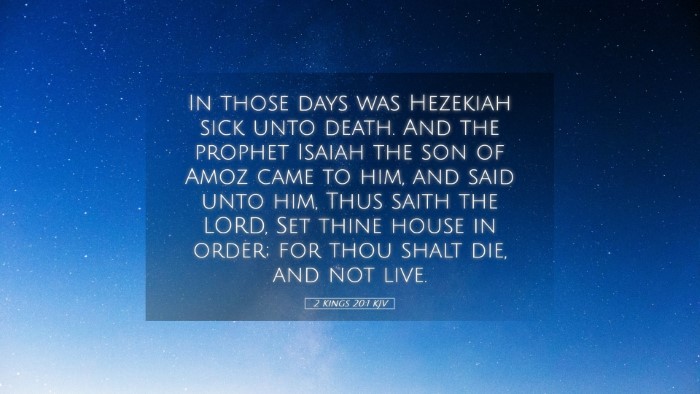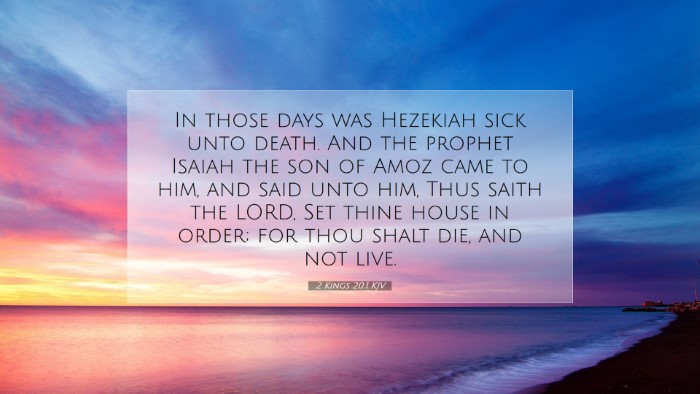Old Testament
Genesis Exodus Leviticus Numbers Deuteronomy Joshua Judges Ruth 1 Samuel 2 Samuel 1 Kings 2 Kings 1 Chronicles 2 Chronicles Ezra Nehemiah Esther Job Psalms Proverbs Ecclesiastes Song of Solomon Isaiah Jeremiah Lamentations Ezekiel Daniel Hosea Joel Amos Obadiah Jonah Micah Nahum Habakkuk Zephaniah Haggai Zechariah Malachi2 Kings 20:1
2 Kings 20:1 KJV
In those days was Hezekiah sick unto death. And the prophet Isaiah the son of Amoz came to him, and said unto him, Thus saith the LORD, Set thine house in order; for thou shalt die, and not live.
2 Kings 20:1 Bible Commentary
Commentary on 2 Kings 20:1
Verse Overview: 2 Kings 20:1 states: "In those days was Hezekiah sick unto death. And the prophet Isaiah the son of Amoz came to him, and said unto him, Thus saith the LORD, Set thine house in order; for thou shalt die, and not live." This verse marks a pivotal moment in King Hezekiah's life, reflecting themes of faith, divine intervention, and prayer.
Contextual Background
The narrative of Hezekiah's illness occurs during a tumultuous period in the history of Judah. Hezekiah, known for his religious reforms and commitment to Yahweh, now faces the reality of his mortality. This moment is critical as it juxtaposes human frailty with divine sovereignty.
The Divine Message
Isaiah’s Prophetic Role: The arrival of the prophet Isaiah signifies the seriousness of the situation. Isaiah, as God’s messenger, delivers a direct and urgent message: Hezekiah is to prepare for death. This commands the king to take action in his personal affairs.
- 1. Impact of Illness: Illness serves as a reminder of the fragility of human life.
- 2. The Call for Order: "Set thine house in order" suggests not just physical preparations, but spiritual readiness as well.
- 3. Prophetic Authority: Isaiah’s role reflects the importance of prophetic voices in guiding kings and nations.
Theological Implications
This verse opens a door to numerous theological discussions:
- 1. The Sovereignty of God: Hezekiah’s impending death is a divine decree that highlights God's control over life and death.
- 2. Human Responsibility: The command to "set thine house in order" emphasizes the human obligation to prepare spiritually and morally.
- 3. Prayer and Intercession: The subsequent prayers of Hezekiah illustrate the biblical principle of seeking God's intervention in dire circumstances.
Insights from Commentaries
Matthew Henry: Henry emphasizes the importance of facing mortality with readiness. He notes that Hezekiah's encounter with Isaiah serves as a wake-up call, urging believers to be cognizant of their life's end and the eternal implications thereof.
Albert Barnes: Barnes provides a detailed analysis of the implications of being told to set one's house in order. He stresses the necessity of spiritual preparedness and how it serves as an exhortation to all believers to remain vigilant and devoted to their faith.
Adam Clarke: Clarke highlights Israel's historical struggle and how Hezekiah’s personal crisis reflects broader national spiritual issues. His commentary suggests that personal health crises can often lead to national reflections on spirituality and reliance on God.
Practical Applications
From 2 Kings 20:1, several applications arise for modern readers:
- 1. Spiritual Readiness: Just as Hezekiah was urged to prepare, believers today must evaluate their lives and spiritual states regularly.
- 2. The Power of Prayer: Hezekiah's prayer following Isaiah's message demonstrates the effectiveness of earnest prayer and reliance on divine mercy.
- 3. A Call to Leadership: Leaders should take the time to order their lives and households, understanding their influence on others.
Conclusion
2 Kings 20:1 serves not only as a historical account of King Hezekiah's illness but also as a profound spiritual lesson for individuals and communities alike. Through the discourse of prophets, the gravity of illness, and the hope offered through prayer, this scripture encourages a deeper relationship with God.


